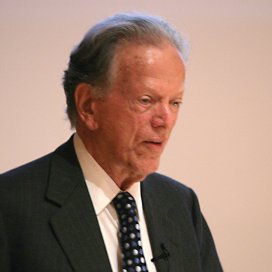Invited by the Collège de France assembly at the suggestion of Pr Anne Fagot-Largeault.
As a young man, Patrick Suppes served in the US Army during the Second World War, in Asia, in the meteorological services. His background in physics and mathematics led to specialized military training in hydrodynamics. The way meteorologists synthesize complex empirical data using mathematical tools remains one of his scientific reference models. After the war, he took a doctorate in philosophy at Columbia University, New York; his research supervisor was Ernest Nagel. For the past fifty years, he has taught philosophy of science at Stanford University, California. He is one of the few contemporary philosophers with a scientific oeuvre: his published articles on measurement theory, on the treatment of hidden variables in quantum mechanics, on linear learning models used by psychologists, have had a wide influence. He believes that the role of a philosopher is not to compete with scientists on their own ground, but to clarify the presuppositions inherent in scientific work. He thus took part in the great debate of the 1970s on the "foundations" of mathematical set theory, and in the reflection on the "axioms" of rational decision proposed to formalize the behavior of actors in economic life. Very early on, he was interested in the use of computers for teaching purposes, and set up a laboratory on the Stanford campus where software for learning logic and languages was being studied. Today, this same laboratory is involved in a neuroscience research program, which aims to identify the cerebral correlates of mental representations, using recording and statistical analysis methods. At the same time, Patrick Suppes, the philosopher, has been reflecting for several years on the old problem of "free will", and on the way in which this problem has been radically modified by the fact that we now know how to define empirical situations in which it is impossible to decide between the deterministic hypothesis and that of random behavior.
Prof. Suppes has been invited several times to the Collège de France. Some will remember the lectures he gave in 1979, at the invitation of Prof. Vuillemin, which led to the publication of the book Logique du probable (Flammarion, 1981). In November 2005, this time at the invitation of Pr. Fagot-Largeault, he gave a public lecture entitled "Neuropsychological foundations of philosophy". In the wake of this lecture, the Chair of Philosophy of Biological and Medical Sciences organized two seminar sessions with the team of Prof. Olivier Dulac (Hôpital Necker) and Dr. Catherine Chiron (lnserm U663, 'Epilepsies de l'enfant et plasticité cérébrale'), who are working on the cognitive impact of certain epilepsies on the developing brain. Prof. Patrick Suppes presented to clinicians some of the research being carried out in his laboratory on structural isomorphisms between words and their cerebral representations. For their part, Drs. Lucie Hertz-Pannier (Inserm U663 and Hopital Necker), Christine Bulteau (Inserm U663 and Fondation Rothschild), Mathieu Milh (Inserm U29), and Isabelle Jambaqué (Institut de psychologie de Boulogne - Université Paris-5) respectively gave presentations on the contribution of imaging to the visualization of normal and pathological neural networks during language development in children, cognitive development after hemispherectomy, sensory-motor network development, and memory development. The lively discussion that followed included Prs. Henri Korn, Pierre Buser, Robert Naquet (Académie des sciences) and Pr. Alain Leplège (Univ. Paris-7). Finally, as he had done informally during one of his visits to Paris in 2002, Prof. Suppes once again took part in a question-and-answer session with the young doctoral students of the Groupe de travail sur l'éthique et la philosophie des sciences (GTEPS). On the occasion of this latest visit, Prof. Suppes was awarded the Collège de France medal.
